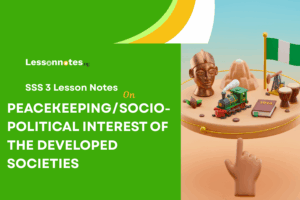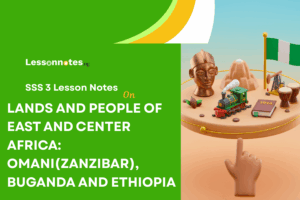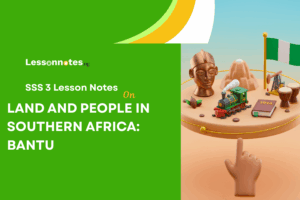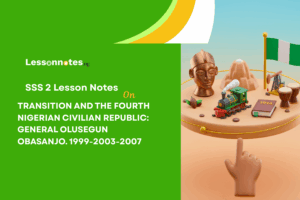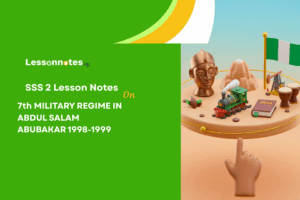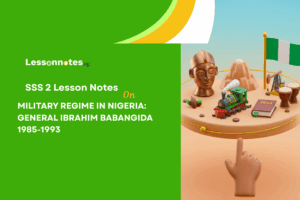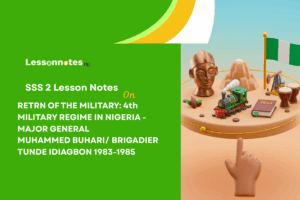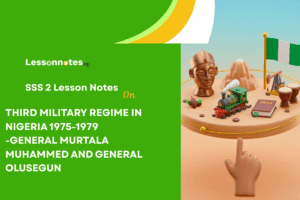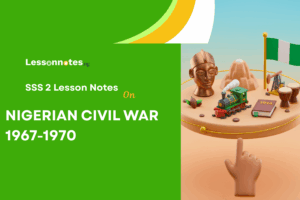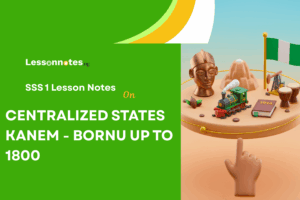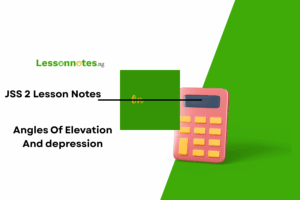Second Civilian Democratic Government In Nigeria 1979-1983 – Alhaji Shagari’s Regime SS2 Nigerian History Lesson Note
Download Lesson NoteTopic: Second Civilian Democratic Government In Nigeria 1979-1983 – Alhaji Shagari’s Regime
After many years of military rule, Nigeria returned to civilian democratic government on October 1, 1979. General Olusegun Obasanjo, who had been ruling as a military leader, handed over power to Alhaji Shehu Shagari. This marked the beginning of Nigeria’s Second Republic.
Shehu Shagari was a teacher who later became a politician. He was from Sokoto State in northern Nigeria. He won the presidential election as the candidate of the National Party of Nigeria (NPN). The election was close, and some people were not happy with the results, but the courts confirmed Shagari as the winner.
The 1979 Constitution
The Second Republic operated under a new constitution, which was different from the one used during the First Republic (1960-1966). Some key features of the 1979 Constitution were:
- It created a presidential system of government similar to that of the United States, instead of the parliamentary system Nigeria had used before
- The president was both head of state and head of government
- It required that the president win not just the most votes, but also at least 25% of votes in two-thirds of the states
- It created a federal system with powers shared between the national government and the states
- It included a list of fundamental human rights
- It required political parties to have members from all parts of Nigeria
Political Structure
Under Shagari’s government, Nigeria had:
- A president (Shehu Shagari) as the executive head
- A National Assembly with two houses:
- The Senate (upper house)
- The House of Representatives (lower house)
- An independent judiciary headed by the Supreme Court
- 19 states, each with a governor and state assembly
- Local governments
Political Parties
The Second Republic had five main political parties:
- National Party of Nigeria (NPN) – Led by Shehu Shagari; won the presidency and the most seats in the National Assembly
- Unity Party of Nigeria (UPN) – Led by Chief Obafemi Awolowo; strong in the southwest
- Nigerian People’s Party (NPP) – Led by Dr. Nnamdi Azikiwe; strong in the southeast
- Great Nigeria People’s Party (GNPP) – Led by Alhaji Waziri Ibrahim; had support in the northeast
- People’s Redemption Party (PRP) – Led by Mallam Aminu Kano; popular among common people in the north
The NPN did not have a clear majority in the National Assembly, so it formed an alliance with the NPP to help pass laws.
Economic Policies and Challenges
The Green Revolution
Shagari launched the “Green Revolution” program to increase food production in Nigeria. The government:
- Gave loans to farmers
- Built dams for irrigation
- Provided fertilizers and better seeds
- Set up river basin development authorities
- Created a land use policy
Despite these efforts, Nigeria still imported a lot of food. The program faced problems like corruption and poor planning.
Housing and Infrastructure
The government started a housing program to build low-cost houses in all states. It also:
- Built new roads and bridges
- Started work on a new steel industry at Ajaokuta
- Expanded electricity supply
- Improved water supply in many areas
Oil Boom and Economic Crisis
When Shagari came to power, Nigeria was enjoying money from high oil prices. The government spent a lot on big projects. However, in 1981, oil prices began to fall, causing serious problems:
- Government income dropped sharply
- Foreign reserves decreased
- Nigeria had to borrow money
- Many projects were abandoned
- Inflation increased
- Unemployment grew
- There were shortages of basic goods
Austerity Measures
To address these problems, the government introduced “austerity measures” (ways to reduce spending):
- Import restrictions
- Higher taxes
- Reduced government spending
- Limits on foreign travel
- Wage freezes
These measures were not popular and caused hardship for many Nigerians.
Social Policies
Education
The Shagari government continued the Universal Primary Education (UPE) program started by the previous government. It also:
- Built new universities
- Expanded technical education
- Gave scholarships to students
- Created a National Open University for distance learning
Health
In the health sector, the government:
- Built more hospitals and clinics
- Started a program to train more doctors and nurses
- Tried to improve rural healthcare
- Launched immunization campaigns
- Worked to provide clean water to reduce diseases
National Youth Service Corps (NYSC)
The Shagari government continued the NYSC program, which required all university graduates to serve the nation for one year. This was meant to promote unity among different ethnic groups.
Foreign Policy
Shagari’s foreign policy focused on:
- Africa as the centerpiece
- Fighting against apartheid in South Africa
- Supporting liberation movements in Africa
- Maintaining good relations with Western countries and the Eastern bloc
- Active participation in the United Nations and the Organization of African Unity
- Promoting regional cooperation in West Africa
- Mediating in conflicts in other African countries
Nigeria expelled many illegal immigrants from other West African countries in 1983, which caused tension with neighboring countries.
Corruption and Mismanagement
One of the biggest problems of the Shagari government was widespread corruption. Government officials were accused of:
- Stealing public funds
- Taking bribes
- Inflating contract costs
- Smuggling goods
- Misusing their positions
The level of corruption made many Nigerians lose faith in the civilian government. The president was seen as a good man, but too weak to control corrupt officials in his party and government.
The 1983 Elections
As Shagari’s first term came to an end, elections were held in August and September 1983. The results showed that the NPN had won by a landslide, with Shagari re-elected and the party winning control of most state governments.
However, these elections were widely seen as fraudulent. There were reports of:
- Vote rigging
- Ballot box stealing
- Violence at polling stations
- Use of police and money to influence voters
- Manipulation of results
The opposition parties rejected the results, leading to tension and instability in the country.
The End of the Second Republic
Just three months after Shagari began his second term, on December 31, 1983, the military took over the government in a coup led by Major General Muhammadu Buhari. The military leaders said they had to take power because of:
- The corrupt practices of the civilian government
- The bad state of the economy
- The rigged 1983 elections
- The breakdown of law and order
This ended Nigeria’s Second Republic and began another period of military rule that would last until 1999.
Achievements of the Shagari Government
Despite its problems, the Shagari government had some achievements:
- Maintained democratic institutions for four years
- Built many infrastructure projects
- Expanded educational opportunities
- Improved Nigeria’s standing in international affairs
- Kept the country united despite political tensions
- Started important agricultural programs
- Handled the transition from military to civilian rule
Failures and Criticisms
The main failures of the regime included:
- Inability to control corruption
- Poor management of the economy when oil prices fell
- Failure to ensure free and fair elections in 1983
- Too much focus on politics instead of development
- Inability to reduce dependence on oil
- Growing inequality between rich and poor
- Ethnic and regional tensions
Legacy
The Second Republic under Shagari taught Nigerians important lessons about democracy:
- The need for strong institutions to fight corruption
- The importance of free and fair elections
- The dangers of depending too much on one resource (oil)
- The need for responsible leadership
- The importance of managing public resources well
Although the Second Republic ended in failure, it was an important step in Nigeria’s democratic journey. Many of the problems faced during this period would continue to challenge Nigeria in its later attempts at democratic government.


